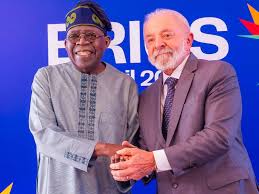President Bola Ahmed Tinubu has called for urgent climate justice for Africa, stressing that the continent suffers disproportionately from a crisis it played little role in creating.
Speaking at the 17th BRICS Summit in Rio de Janeiro, Brazil, on Saturday, July 6, 2025, Tinubu urged world leaders to adopt a fairer, more inclusive global approach to climate, healthcare, and financial governance.
“Africa has contributed the least to global emissions but suffers the most,” the Nigerian president stated, decrying the imbalance between the continent’s minimal environmental footprint and the severe consequences it faces from climate change.
Addressing fellow leaders from the Global South and other emerging economies, Tinubu called for a reform of global governance and financing systems to ensure African nations gain equitable access to climate funding, technology transfer, and decision-making platforms.
He acknowledged the bold efforts already underway across the continent—including the African Carbon Market Initiative and the Great Green Wall—but insisted that international solidarity and justice-driven partnerships remain crucial for meaningful progress.
“As we approach COP-30, we believe BRICS must be more than an economic bloc. It must be a beacon for climate solutions, solidarity, and the shared future we all hope to build,” Tinubu said.
This year’s summit marked Nigeria’s debut as an official BRICS partner, following its formal recognition in January 2025. Tinubu was joined by Minister of Foreign Affairs Yusuf Tuggar and Minister of Finance Wale Edun.
Reaffirming Nigeria’s commitment to sustainable development, Tinubu highlighted the country’s priorities, including scaling up renewable energy, improving healthcare delivery, and strengthening South-South cooperation. He also underscored the importance of youth inclusion in policy planning, noting that 70% of Nigeria’s population is under 30.
In the face of widening global inequality and mounting environmental and health challenges, Tinubu’s address was a firm appeal for climate justice and structural reforms to ensure a more equitable global future.









